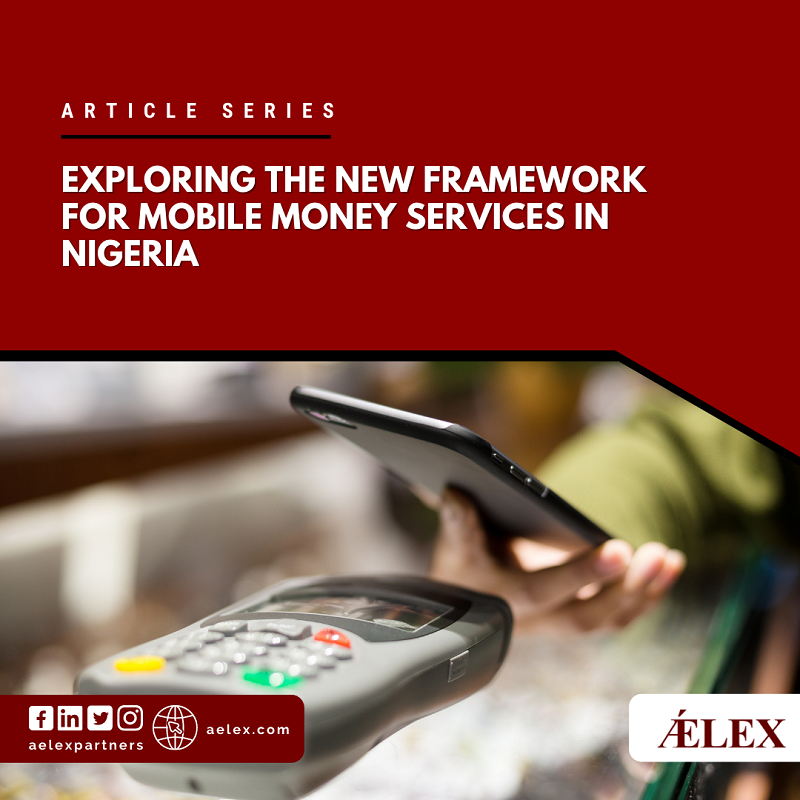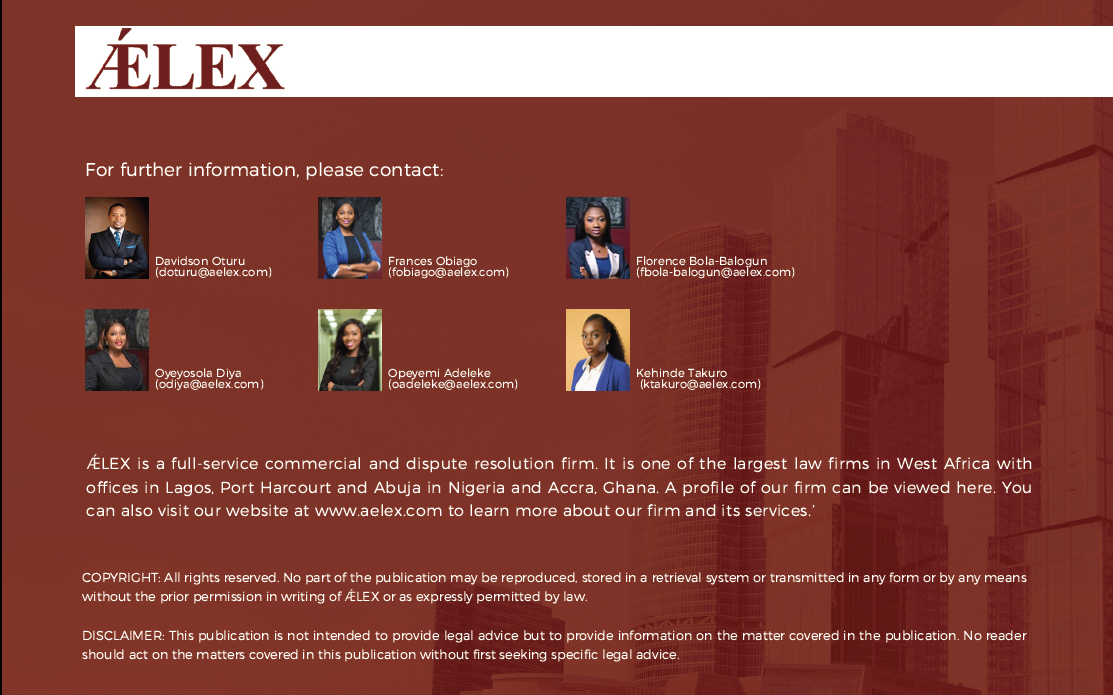The Central Bank of Nigeria recently issued the Regulatory Framework for Mobile Money Services in Nigeria and the Guidelines for Mobile Money Services in Nigeria which sets out the modalities for providing mobile money services in Nigeria.
In this article, our Davidson Oturu, Frances Obiago and Ifeoluwa Ebiseni examine the provisions of the Framework and Guidelines vis-à-vis previous regulations on the subject matter in Nigeria and provide insights on the development of mobile money services in Nigeria when compared to similar jurisdictions.
Introduction
On 9 July 2021, the Central Bank of Nigeria (“CBN”) issued the Regulatory Framework for Mobile Money Services in Nigeria (the “Framework”) and the Guidelines for Mobile Money Services in Nigeria (the “2021 Guidelines”). These regulations were issued to reiterate, clarify and supplement the provisions of the existing regime for mobile money services (“MMS”) in Nigeria.
In this article, we discuss the background/ pre-existing framework for MMS in Nigeria, the provisions of the Framework and Guidelines, lessons drawn from other jurisdictions, as well as our thoughts on MMS in Nigeria.
Background
MMS was first introduced in Nigeria in July 2009, through the CBN’s Guidelines on Mobile Money Services (the “2009 Guidelines”). Following this, the CBN began accepting applications by prospective Mobile Money Operators (“MMOs”).
Two models were introduced – the bank led model and the Non-Bank led model. Telecommunications companies (“Telcos”) were however precluded from operating as MMOs. Despite this move by the CBN to deepen financial inclusion, it was reported by the Enhancing Financial Innovation & Access, five years after the introduction of the 2009 Guidelines, that only about 800,000 Nigerian adults used mobile money, representing less than one percent of the adult population.[1]
This slow development may have been one of the reasons for the release of Guidelines for Mobile Money Operators in 2015 (the “2015 Guidelines”).[2] However, the 2015 Guidelines, like its predecessor, prohibited Telcos from acting as MMOs.
The 2021 Guidelines
The main objective of the 2021 Guidelines is to ensure a structured and orderly development of MMS in Nigeria, with clear definition of various participants and their expected roles and responsibilities.
Similar to the 2009 and 2015 Guidelines, the 2021 Guidelines prohibits Telcos from acting as MMOs. The 2021 Guidelines also retain the two models for the provision of MMS in Nigeria – the Bank led model and Non-Bank led model.
All MMOs are to be licensed by the CBN, issued with a unique Scheme Code by the Nigeria Inter-bank Settlement System Plc (NIBSS) for managing interoperability and unique short codes by the Nigeria Communications Commission (NCC). They must also ensure that all telecommunication equipment that would be used in order to provide their services are type-approved by the NCC.
· Permissible and Non-Permissible Activities of MMOs
MMOs are permitted under the 2021 Guidelines to carry out the following:
- Wallet creation and management;
- E-money issuing;
- Agent recruitment and management;
- Pool account management;
- Non-bank acquiring as stipulated in the regulatory requirements for non-bank merchant acquiring in Nigeria;
- Card Acquiring; and
- Any other activities that may be permitted by the CBN.
However, they are precluded from carrying out the following activities:
- Granting any form of loans, advances and guarantees (directly or indirectly);
- Accepting foreign currency deposits;
- Dealing in the foreign exchange market except as prescribed in Section 4.1 (ii & iii) of the extant Guidelines for Licensing and Regulation of Payment Service Banks in Nigeria;
- Insurance underwriting;
- Accepting any closed scheme electronic value (e.g., airtime) as a form of deposit or payment;
- Establishing any subsidiary;
- Undertaking any other transaction which is not prescribed by the Guidelines; and
- Any other activities that may be prohibited by the CBN.
· Nominee/Settlement Account
MMOs are to maintain separate settlement bank accounts for MMS and are to notify the CBN of their settlement banks. The settlement accounts are to be opened as nominee accounts on behalf of their customers.
-
Savings Wallets
MMOs are now permitted to offer savings wallet services to meet the demands of the unbanked in Nigeria. This is an improvement from the provisions of the 2015 Guidelines.
However, an MMO who intends to provide savings wallet services must notify the CBN and obtain a letter of no-objection from the CBN before proceeding. The MMO is to maintain two accounts in a settlement bank- one for the principal sum (Savings Wallet Principal Pool Account) and another for the interests (Savings Wallet Interest Pool Account), which are to be insured with the Nigeria Deposit Insurance Corporation (“NDIC”).
Furthermore, funds in savings wallets can only be invested in Nigerian Treasury Bills. The 2021 Guidelines also makes provision for the interest rate and the modalities for the distribution of interests on a savings wallet (i.e, a wallet earning interest).
-
Insurance
MMOs are now expressly required to make provisions for deposit insurance cover with the NDIC, to guarantee the funds of mobile money deposit wallet subscribers. In the event of the failure of the settlement bank, the NDIC is to give effect to the maximum coverage level prescribed in the NDIC Framework for the Establishment of Pass-Through Deposit Insurance for subscribers of MMOs. This insurance also extends to the funds of savings wallet subscribers.
-
Transaction Limit and KYC Requirements
MMOs are required to comply with the existing CBN provisions on AML/CFT and KYC/CDD. The 2021 Guidelines sets out the transaction limits for each tier of customer, depending on the KYC information provided to the MMOs by the customer.
-
Statutory Returns
MMOs are to submit returns on transactions processed to the CBN at the end of every month and, in any case, not later than the 14th day of the next month. They are also required to submit their audited annual returns within the first three months after the year end or 31st of March.
-
Mobile Network Operators
The 2021 Guidelines sets out guiding principles for the participation of mobile network operators. They include the following:
- Ensuring that customers are free to use any mobile money scheme service of their choice;
- Not receiving deposits from the public, except in respect of the airtime billing of their customers; and
- Not allowing the use of the airtime value loaded by their customers for purposes of payments or to transfer monetary value.
The Framework
The objective of the Framework is to provide an enabling environment for the adoption of MMS in reducing cash dominance in the Nigerian economy and ensuring the structured and orderly development of MMS in Nigeria, with the clear definition of various participants and their expected roles and responsibilities.
The Framework defines and regulates the activities of the different participants in MMS including:
- Mobile Money Operators – are defined as Banks and corporate organizations approved by the CBN to carry on mobile money operations who are to provide the required infrastructure (hardware, software, switching and security) for MMS.
The MMOs are the lead initiators for the mobile scheme and shall be responsible for ensuring that the various solutions and services within an approved mobile payment scheme meet the regulatory requirements as defined in the Framework and as may be specified from time to time.
- Infrastructure Providers – Organizations providing infrastructure that enable switching, processing and settlement facilities for MMS.
- Other Service Providers – Entities engaged by MMOs to provide support services.
-
Methods of Providing MMS
Bank Account Based – This is a mobile money system that drives transactions through the bank accounts of customers.
- Card Account Based – This covers scenarios where a payment card is linked to a mobile phone for the purpose of initiating and concluding payment transactions.
- Stored Value (e-Wallet) Account Based – This is a scenario where a mobile money system drives transaction through a system-based account.
Lessons from other Jurisdictions
A number of African countries have embraced MMS and this has aided in stimulating financial inclusion in these countries. Countries like Kenya, Uganda, Tanzania, Rwanda, Botswana, Senegal, Cote d’Ivoire and Ghana have particularly benefitted from the introduction of MMS in their economies.
The success rate of MMS in these countries may be traced to the model adopted by these countries in providing the services.
In Kenya for example, the regulators adopted a wait-and-see approach at inception and subsequently allowed the Telco-led model. M-Pesa was launched by the dominant Telco in Kenya and was able to ride on their existing network of airtime distributors, thus eliminating the need to build an extensive distribution network.[3] MMOs in Kenya are also allowed to carry out inbound and outbound remittances.
Data released by the Central Bank of Kenya revealed that mobile money transactions in the country stood at $38.5 billion in 2018, a 10 percent increase when compared to 2017. By the end of 2017, 83 percent of Kenya’s population had access to financial services, according to the apex bank.[4]
Ghana also operates a model similar to Kenya. According to the World Bank “Enhancing Financial Inclusion” report, the percentage of Ghanaian adults with a registered financial account increased from 41% to 58% between 2014 and 2017.[5] This rise was largely led by the increased participation in mobile money.
Conclusion
The CBN indeed keeps making moves to deepen financial inclusion in Nigeria. Although many stakeholders have criticised its prohibition of the Telco-led model of MMS, the CBN has retained its position, one of the reasons being that competition may be stifled as the Telcos are already big industry players.
Although it may be argued that the CBN’s position is valid, it may also slow down innovation and financial inclusion in Nigeria. This notwithstanding, the 2021 Guidelines and Framework are both welcome developments and may have provided a path for the progression of MMS in Nigeria.
[1] Prateek Shrivastava, “The Hold Up with Mobile Money in Nigeria”- Centre for Financial Inclusion, available at https://www.centerforfinancialinclusion.org/the-hold-up-with-mobile-money-in-nigeria
[2] The CBN Guidelines for Mobile Money Services and the CBN Framework for Mobile Money Services
[3] Ibid
[4] Ibid
[5]https://www.modernghana.com/news/950191/how-mobile-money-is-driving-financial-inclusion.html





